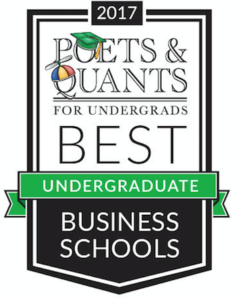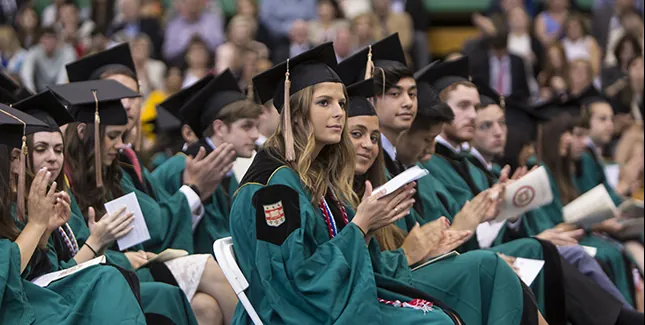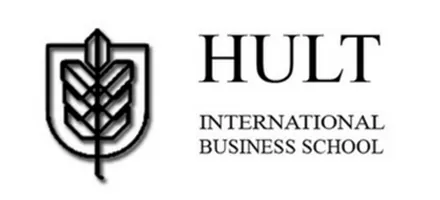
The University of Pennsylvania’s Wharton School topped this year’s Poets&Quants’ Best Undergraduate B-schools ranking. Courtesy photo
Two years, two different winners. In the second annual Poets&Quants ranking of undergraduate business schools, a new — though familiar — school has vaulted to the top. This year, the University of Pennsylvania’s Wharton School knocked off last year’s winner, the Olin Business School at Washington University in St. Louis, which finished right behind it in second place. Among 82 of the best undergraduate business programs in the country, no other business school currently provides a better undergraduate experience than Wharton.
 According to Lori Rosenkopf, the vice dean and director of Wharton’s undergraduate program, it all comes down to fundamentals. “I think our Dean Geoff Garrett says it best: ‘We do the right things for our students and the rankings will take care of themselves,’” Rosenkopf tells Poets&Quants. “We really focus on the fundamentals in educating our students and we’re really glad that this ranking is reflecting our success on that front.”
According to Lori Rosenkopf, the vice dean and director of Wharton’s undergraduate program, it all comes down to fundamentals. “I think our Dean Geoff Garrett says it best: ‘We do the right things for our students and the rankings will take care of themselves,’” Rosenkopf tells Poets&Quants. “We really focus on the fundamentals in educating our students and we’re really glad that this ranking is reflecting our success on that front.”
Indeed, the Poets&Quants approach to ranking undergraduate business programs is set up to identify those fundamentals. Just as we did last year, the ranking equally weighs admission standards, alumni satisfaction with the quality of the academic experience, and career outcomes. Last year Olin didn’t outright win any of the three categories, but placed highly in each of them. This year, Wharton landed in a much more dominant position. The Ivy League school in Philadelphia finished first in admission standards and employment outcomes and second in the alumni satisfaction survey to claim its first-place finish by nearly 10 full index points (out of a possible 100).
BIG WINNERS INCLUDE B-SCHOOLS AT WASHU, UVA, NOTRE DAME & GEORGETOWN
After Wharton and Olin, the University of Virginia McIntire School of Commerce, the University of Notre Dame Mendoza College of Business, and Georgetown University’s McDonough School of Business, rounded out the top five, respectively. Virginia catapulted five spots from eighth place last year for its third-place finish, buoyed by gaining the highest satisfaction marks of any business school in the alumni survey.
The ranking is based on hard data self-reported by schools, including average SAT scores and acceptance rates for this fall’s incoming class of students, total starting compensation and full-time employment percentages for the graduating Class of 2017, and answers by alumni of the Class of 2015 to 43 wide-ranging questions about their undergraduate experience, including the accessibility of faculty, the value of the alumni network, and an assessment of a school’s career services professionals. In addition, schools are rewarded for providing students with global and other signature experiences, largely consulting projects with companies, and schools’ success in helping their graduates land jobs at their targeted employers and industries.
In the alumni survey, which garnered responses from nearly 7,000 members, Wharton topped out in such categories the effectiveness the business degree was in helping a student climb to a new socioeconomic status, the strength of the alumni network, and how beneficial the degree was to graduates in helping them achieve a dream career. Wharton’s strength of not only getting graduates into high paying jobs but also in desired industries and companies, was evident throughout both school and alumni data (see 2017 Rankings Report Card: How Alumni Grade Their Schools).
STELLAR JOB REPORTS AND SUPREME ALUMNI SATISFACTION LIFT WHARTON TO THE TOP
According to the alumni survey, conducted from August to October of this year (2017), a perfect 100% of Wharton’s grads said their first jobs were in a “desired industry” (see B-Schools That Help You Get The Job You Really Want). Wharton also reported a 2017 average salary of $80,566—higher than ever before. Add in the average signing bonus of $12,703, reported by 79% of graduates and Wharton’s average starting total compensation exceeded $90,000—also a first (see What Business Majors Made This Year In Their First Jobs). Plus, 97.9% of the Class of 2017 seeking employment landed full-time positions within 90 days of graduation.
Wharton believes those stellar job outcomes are there result of its focus on the basics of business in accounting, finance, marketing and strategy. But they also are a function of superior selection and a career services office that prepares its students for a market eager to employ them. Wharton’s career officials do an excellent job of advising students, of holding resume and interview training sessions, setting up career panels and on-campus info sessions with employers, organizing career fairs, and hosting hundreds of different employers on campus to conduct interviews for both internship and full-time job opportunities.
“We provide our students with amazing technical fundamentals,” Rosenkopf explains. “Wharton for many years has been recognized as providing excellent technical fundamentals for students and our new curriculum continues to provide those. Now we’re looking to ensure that our students also have complementary training in leadership skills, and we’ve expanded that training.”

Commencement at Washington University’s Olin Business School, which finished second in this year’s P&Q ranking of best undergraduate business schools. Photo by Jerry Naunheim Jr.
MORE THAN 80 SCHOOLS INCLUDED IN THIS YEAR’S RANKING
In all, 82 schools were ranked this year— an increase of 32 schools from the 50 in last year’s debut ranking. These schools represent the top 16% of accredited undergraduate business schools in the U.S. A handful of the schools on the list have acceptance rates tougher than Harvard Business School’s full-time MBA program. They boast innovative student-run clubs in such areas as entrepreneurship and social enterprise as well as student-run investment funds that regularly churn out high returns. And these programs are graduating future business leaders at mind-boggling levels of compensation from the get-go.
The Poets&Quants ranking was launched in 2016 after a year of collaboration with business school deans and administrators from leading institutions. It was slightly tweaked this year based on feedback from deans and administrators at dozens of schools (see our detailed explanation of our methodology). The only other established and reputable ranking for undergraduate business education currently comes from U.S. News and World Report and it is based solely on an opinion survey of deans and senior faculty. The result is a U.S. News ranking based largely on popularity, a list that has remained virtually unchanged for years despite up-and-coming programs and continual innovations at established schools.
Conversely, our ranking takes business-school specific admissions data, including average SATs for newly enrolled students, the percentage of incoming students who finished in the top 10% of their high school classes, and each school’s acceptance rate for applicants. It also factors alumni satisfaction on every important dimension of the educational experience, with answers to 18 of 43 core questions meant to gain meaningful information on their undergraduate years. Lastly, the ranking includes business-school specific data on employment outcomes, such as the percentage of graduates who landed a job soon after graduation, average total compensation in first jobs, and the percentage of students to complete a full-time internship before their senior year. Schools that enroll driven, talented, and smart students, provide them with a top-notch educational experience, and then help them secure solid jobs in the industries and companies they desire rise to the top of our list.
© Copyright 2026 Poets & Quants. All rights reserved. This article may not be republished, rewritten or otherwise distributed without written permission. To reprint or license this article or any content from Poets & Quants, please submit your request HERE.










